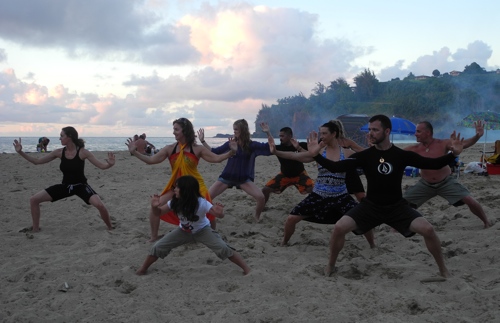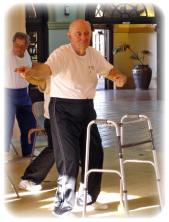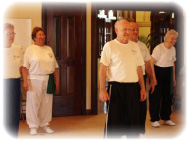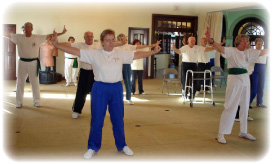Zen Wellness Tai Chi
Why Tai Chi?
Tai Chi is both a preventive and a complementary therapy for a wide range of conditions. Specifically, it is beneficial for chronic pain, gout, heart disease, high blood pressure, arthritis, osteoporosis, headaches, and sleep disorders. Tai Chi is also beneficial for the immune system and the central nervous system, which makes it especially good for people with a chronic illness, anxiety, depression or any stress-related condition. The deep breathing of Tai Chi regulates the respiratory system helping to treat respiratory ailments such as asthma, bronchitis, and emphysema. It also stimulates the abdomen, which aids digestion and helps relieve consti pation and gastrointestinal conditions. Many studies indicate that elderly people who practice Tai Chi are much less prone to falls, a serious health risk to people in that age group.
anxiety, depression or any stress-related condition. The deep breathing of Tai Chi regulates the respiratory system helping to treat respiratory ailments such as asthma, bronchitis, and emphysema. It also stimulates the abdomen, which aids digestion and helps relieve consti pation and gastrointestinal conditions. Many studies indicate that elderly people who practice Tai Chi are much less prone to falls, a serious health risk to people in that age group.

Millions of people world wide, enjoy the long-term benefits of practicing Tai Chi. Our Tai Chi program offers courses for the total beginner or the advanced practitioner.
Tai Chi improves overall fitness, coordination, and agility. People who practice Tai Chi on a regular basis tend to have good posture, flexibility, and range of motion, are more mentally alert, and sleep more soundly at night.
Zen Wellness – Tai Chi and Health
 By Dr. David Frens
By Dr. David Frens
Retired Neurologist
1st degree Black Belt
Sun City West, AZ
As we enter the twenty-first century, chronic health issues have become an increasing concern. This seems especially true for seniors who are experiencing these conditions and are seeking ways to prevent or treat their chronic health conditions and enhance their quality of life. While the preceding century saw much advancement in care and prevention, it, unfortunately, also saw a rise in stress and sedentary life style related aliments, including obesity, anxiety, hypertension, musculoskeletal impairments, bowel dysfunction, and many more. These later conditions have several factors in common: many can be prevented by life style changes and many are often quite resistant to conventional treatment once they have become chronic. Additionally, in many cases, conventional treatments appear to be associated with a significant incidence of side effects.

Because of these issues, health care trends in the twenty-first century are moving toward a willingness to try treatme nt approaches derived from cultures and philosophies which differ from those in western cultures. An example of this is the growing interest in western cultures in Chinese Tai Chi and other energy enhancing breathing exercises as tools useful in proactive health maintenance and treatment of chronic health impairments.The Chinese culture has used Tai Chi and Chi Gong (energy enhancing breathing exercises) for centuries to maintain a healthy body and calm mind. Many in western cultures who have learned these practices have noted similar beneficial effects.
In terms of treating chronic disease, Chinese medicine teaches that Tai Chi and Chi Gong beneficially stimulate all organ systems, helping to prevent or treat disease. A recent study using empiric western methodology found that performance of Tai Chi by seniors with shingles could significantly reduce the pain in those performing Tai Chi versus those not doing so. One explanation for the findings would be the possibility that performance of Tai Chi enhanced the immune system – an explanation in agreement with the Chinese belief that Tai Chi can enhance all organ system functions, including those of the immune system. These touch points between eastern and western beliefs and practices in areas of health maintenance and disease treatment should prove useful in providing future innovative approaches to the goal of achieving an enhanced life experience.
the pain in those performing Tai Chi versus those not doing so. One explanation for the findings would be the possibility that performance of Tai Chi enhanced the immune system – an explanation in agreement with the Chinese belief that Tai Chi can enhance all organ system functions, including those of the immune system. These touch points between eastern and western beliefs and practices in areas of health maintenance and disease treatment should prove useful in providing future innovative approaches to the goal of achieving an enhanced life experience.
So, what is Tai Chi, can seniors do it, and does it have beneficial effects? These are the impact questions for seniors to consider.
Tai Chi is one of the Chinese martial art techniques which have been practiced in various styles for centuries. At first, its primary use was for self defense. Much more recently, the Yang style of Tai Chi has been practiced by millions in China and around the world primarily for its health maintenance and psychological stress releasing benefits.
Tai Chi incorporates slow, low impact movements of the limbs and torso, accompanied with controlled breathing, to stimulate organ systems; to enhance energy; to improve strength, flexibility, and balance; and to reduce psychological stress responses. It does not require use of medication to achieve results. When done properly, it is virtually side effect free. It does require patience and dedication to learn the techniques.
A beauty of Tai Chi is that it can be learned and practiced by anyone at any age. This is especially important for senior who may feel they are too old to begin. The instruction can be tailored to existing conditions and abilities. Seniors should view the learning and performing of Tai Chi as a treat to themselves for the purpose of enhancing their quality of life.
Does it work in the areas of health maintenance and as treatment for chronic conditions? The answer comes from reproducibility of experience and study of results using scientific methodology. The answer appears to confirm a positive relation between enhancement of health and performance of Tai Chi.
First, there are reports of the health bene fits from practicing Tai Chi fou nd in Chinese medical and martial arts writings over multiple centuries. The practice of Tai Chi is currently performed on a daily basis by untold numbers of Chinese and others around the world who affirm their conviction as to its positive effects on maintaining health and combating disease.
fits from practicing Tai Chi fou nd in Chinese medical and martial arts writings over multiple centuries. The practice of Tai Chi is currently performed on a daily basis by untold numbers of Chinese and others around the world who affirm their conviction as to its positive effects on maintaining health and combating disease.
Second, there is critical analysis of one’s own experience. As a health care professional, I have always attempted to critically assess the effect of treatment. I have tried to be very critical in assessing the effects of my practice of Tai Chi on my own health. I believe the results are clearly positive. I am more physically fit, have noted improvement in a chronic back pain problem, and have an invigorated sense of proactively helping myself to an improved state of health. All of this has contributed to my experiencing a calmer state of mind and a lowered sense of psychological stress.
Third, there are scientific studies that examine the relationship between the practice of Tai Chi and health. The shingles study is an example of this. It employed scientific methods and showed improvement in the pain of shingles in patients performing Tai Chi. Scientific studies are, as yet, rare; however, the demonstration that Tai Chi can be of benefit in the treatment of a condition which is difficult to treat successfully by current conventional means, the increasing interest in innovative treatment for many other chronic conditions, and the need for successful health maintenance programs should stimulate more research into the link between Tai Chi and health.
The bottom line for seniors is that they should be proactive in adopting a health maintenance program no matter their age. In choosing a program Tai Chi is an excellent choice because it joins low impact movements with proper deep breathing to enhance strength, flexibility, balance, organ system stimulation and energy production. Two things are required: patience and an experienced instructor. Tai Chi is learned over time through experienced instruction and practiced for a lifetime. The time to start is now with no ending date in sight.
